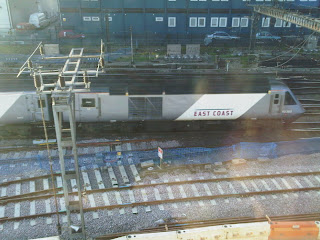 October 2009: Two diesel and two electric services operated by National Express, a few days before the franchise was turned over to East Coast.
October 2009: Two diesel and two electric services operated by National Express, a few days before the franchise was turned over to East Coast.
It's nearly two years since I first wrote about King's Cross Station (click to read original story) so perhaps a brief update is in order. The 1852 station was designed by Lewis Cubitt for the Great Northern Railway and, according to Network Rail, was based on the design of "the riding school of the Czars of Moscow".
It seems I was not alone in being aggrieved by what I called "thoughtless modern adaptations and extensions" presently giving passenger access to the main platforms. Apparently, this structure was intended to be 'temporary' when erected by British Rail in 1972. The good news is that, forty years on, it is due to be removed so that the original appearance of the facade of the trainsheds can be revealed. To achieve this, a new station building is being built on the west side of the station. This should improve passenger flows, particularly to and from the adjacent St. Pancras International.
In 2008, I was pleased to note the retention of the footbridge shown in the picture above. Alas, this has now succumbed as part of the rebuilding and the picture below shows some of the forlorn remains of the bridge.
 Remains of footbridge view in 2009
Remains of footbridge view in 2009
King's Cross doesn't seem to be having any better luck with its main line train operating franchisees. GNER were awarded the franchise in 1996, successfully renewed the franchise but were then invited to surrender their franchise in December 2006. GNER continued to run the service under a 'management contract' for a year. In December 2007, National Express East Coast took over, only for their parent National Express to withdraw support in July 2009. With maximum acrimony, National Express have recently been replaced by East Coast. 'East Coast' is a private company wholly owned by the Government (not to be confused with a 'nationalised railway' - New Labour dumped Clause 4 some years ago).
 Now with 'East Coast' markings, a re-badged Class 43 passes King's Cross Power Box.
Now with 'East Coast' markings, a re-badged Class 43 passes King's Cross Power Box.
Part of the rebuilding at Kings Cross involves the creation of a new terminal platform. The picture below shows the major civil engineering work in progress to drive the new track on the extreme East Side, next to the present Platform 1.
 Preparations for the new platform at King's Cross
Preparations for the new platform at King's CrossIt was only when I saw this view that I was reminded that, until 1976, King's Cross had two through platforms. Up suburban trains stopped at a platform called King's Cross York Road before diving underground on what was called the York Road Curve, joining the 'Widened Lines' and terminating at Moorgate. In the opposite direction, trains from Moorgate left the 'Widened Lines' on the Hotel Curve, surfaced on the west side of King's Cross at Platform 16 and continued northwards. In 1976, these suburban services were diverted to reach Moorgate via the Northern City Line (previously operated by London Underground) and King's Cross lost its through platforms.
It looks from the picture above as if the East Side Offices at King's Cross were built to accommodate access at ground level. Was this for a carriage road? Can anybody confirm? The new construction appears to be taking advantage of this facility. I'm told the new platform is to be called 'Y' (to which I replied 'Why?' but I suppose it could be 'Y' for 'York Road').
There's a rather prosaic Network Rail Site and a useful Wikipedia article.
My (extended) collection of pictures is here.

